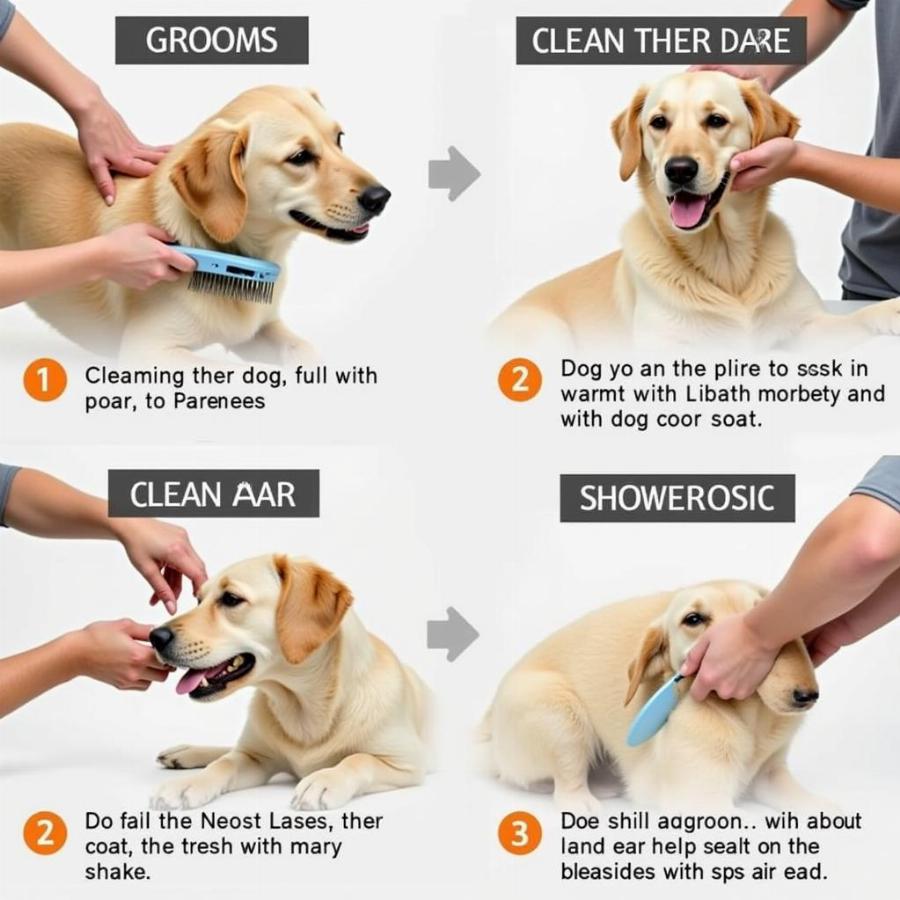The Lab Pyrenees dog, a mix between the Labrador Retriever and the Great Pyrenees, is becoming increasingly popular. These gentle giants offer a unique blend of loyalty, affection, and protective instincts. But are they the right fit for your family? This article dives deep into everything you need to know about the Lab Pyrenees dog, from their temperament and care requirements to potential health concerns and training tips.
Understanding the Lab Pyrenees Mix
This crossbreed combines the playful and friendly nature of the Labrador with the calm and protective instincts of the Great Pyrenees. This results in a dog that is typically gentle and affectionate with family members, yet wary of strangers, making them excellent family companions and watchdogs. Their appearance can vary, inheriting traits from both parent breeds. They can have the thick, double coat of a Pyrenees or the shorter, water-repellent coat of a Lab, and their coloring can range from white and cream to black and chocolate.
Temperament and Personality: Gentle Giants with a Protective Streak
Lab Pyrenees dogs are known for their gentle and loving nature. They are typically patient and tolerant, making them great with children. However, their large size means they can accidentally knock over small children, so supervision is essential. Their protective instincts, inherited from the Great Pyrenees, make them natural watchdogs. They are alert and will bark to alert you of anything unusual.
Caring for Your Lab Pyrenees Dog
Caring for a Lab Pyrenees involves understanding their specific needs, including diet, exercise, grooming, and training. They are large, active dogs requiring substantial exercise to stay healthy and happy. Daily walks, runs, or playtime in a fenced yard are essential.
Feeding Your Gentle Giant
A balanced diet is crucial for their overall health. Choose high-quality dog food formulated for large breeds. The amount will depend on their age, activity level, and individual metabolism. Consult your vet for specific feeding recommendations.
Grooming: Managing That Luxurious Coat
Grooming requirements vary depending on the coat type they inherit. Regular brushing is essential to prevent matting and remove loose fur. Dogs with a thicker Pyrenees-like coat will need more frequent brushing.
Training: Positive Reinforcement is Key
Lab Pyrenees dogs are intelligent and eager to please, making them relatively easy to train. Positive reinforcement methods, such as rewarding good behavior with treats and praise, work best. Early socialization is also crucial to ensure they develop into well-adjusted adults.
 Lab Pyrenees Dog Grooming
Lab Pyrenees Dog Grooming
Health Considerations for Lab Pyrenees Dogs
While generally healthy, Lab Pyrenees dogs can be prone to certain health conditions, like hip and elbow dysplasia, common in large breeds. Regular vet checkups are essential to monitor their health and address any potential issues early.
Is a Lab Pyrenees Dog Right for You?
A Lab Pyrenees dog can be a wonderful addition to a family that can provide them with the necessary space, exercise, and attention. Their gentle nature, loyalty, and protective instincts make them excellent companions.
Conclusion
The Lab Pyrenees dog, a unique blend of Labrador and Great Pyrenees, offers a loving and protective companion for the right family. Understanding their needs and providing proper care is key to ensuring a long and happy life together. Consider adopting a Lab Pyrenees if you’re looking for a gentle giant to join your family.
FAQ
- How big do Lab Pyrenees dogs get? They typically reach 70-100 pounds and stand 24-32 inches tall.
- Are they good with other pets? Early socialization is key, but they generally get along well with other pets.
- How much exercise do they need? They require substantial daily exercise, including walks, runs, and playtime.
- Do they bark a lot? They can be vocal, especially when acting as watchdogs.
- Are they easy to train? Yes, they are intelligent and respond well to positive reinforcement.
- What is their lifespan? They typically live 10-12 years.
- Are they hypoallergenic? No, they are not hypoallergenic.
More Questions? Explore More About Dog Breeds!
Check out our other articles about similar breeds: pyrenees lab dog and labrador pyrenees dog. You might also be interested in learning more about the australian cattle dog labrador retriever mix. Looking for grooming tools? Visit our page on dog grooming tools for sale. For more lovable companions, explore our article on the cuddliest dog breeds.
Beaut Dogs: Your Guide to the Canine World
Beaut Dogs is your one-stop shop for all things canine, offering expert advice and resources for dog lovers. From breed information to care guides, we are committed to providing valuable information to help you give your furry friend the best possible life. When you need assistance, don’t hesitate to contact Email: [email protected] for detailed and accurate answers from Beaut Dogs. Visit https://beautdogs.com today!